Last Updated on 3 months ago by Gila
Pros and Cons of Online Business Models: Overview of Models
Pros and cons of online business models can feel confusing at first, especially in 2025, but once you see them side by side it becomes much easier to choose a calm, low-stress path.This retiree-friendly guide compares the pros and cons of different online business models so you can pick a calm, low-stress path in 2025. We’ll walk through what each model demands (time, budget, tech) and where it shines, then finish with a decision checklist you can print.
TL;DR: There is no single “best” online business model. The right one is the calmest fit for your time, energy, budget, and appetite for customer support.
- Affiliate + blogging: lowest cost and stress; slower to first dollars but compounding over time.
- Freelancing: fastest to first income; trades time for money and involves client management.
- Digital products, courses, and memberships: higher margins, but require creation and ongoing support.
- Dropshipping and print-on-demand: no inventory, but thin margins, shipping issues, and more moving parts.
- Most retirees do well starting with one “quiet” model, then adding a second once routines feel steady.
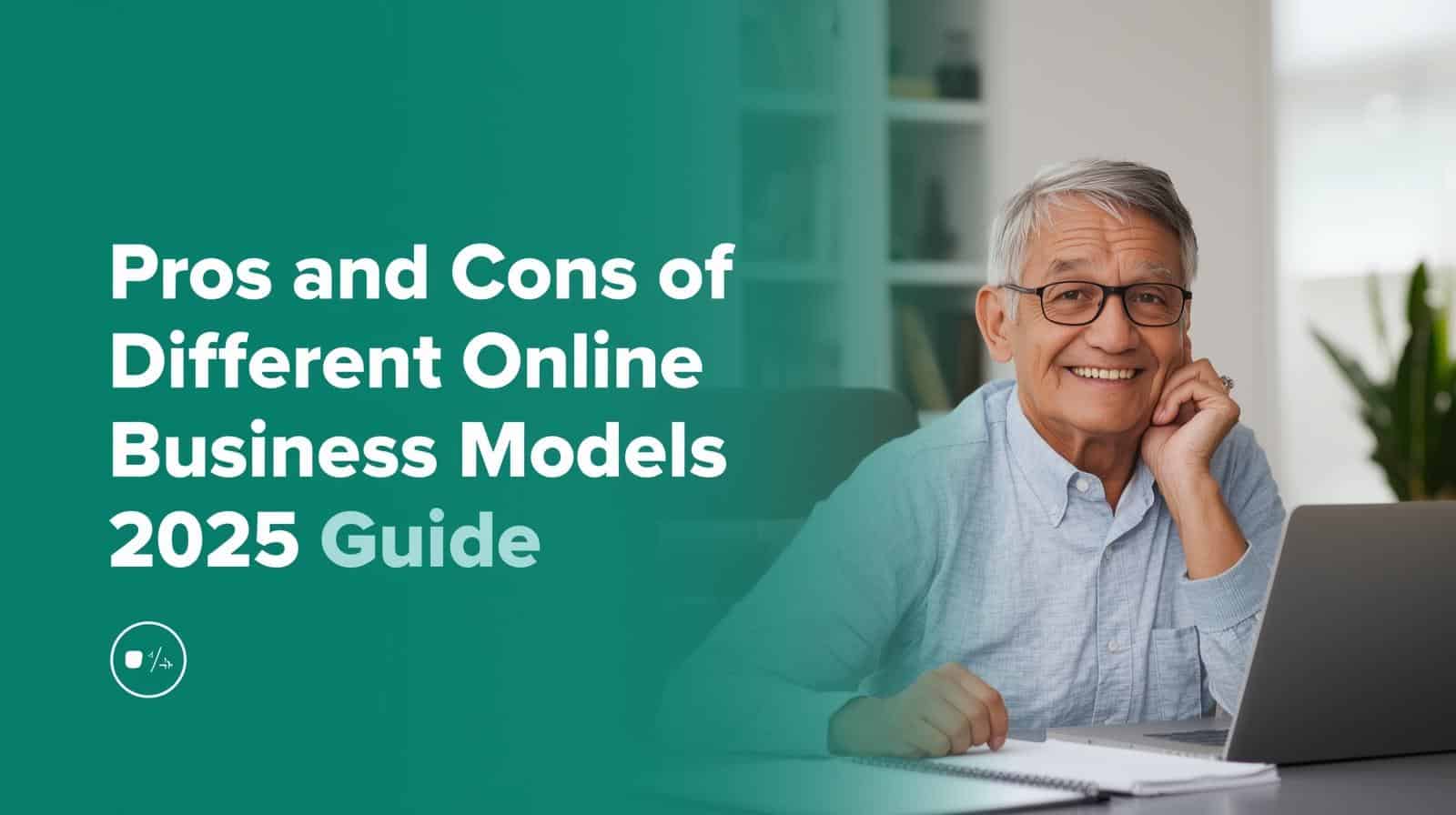
The Big Picture: Models at a Glance
There’s no single “best” online business—only the one that fits your life. We’ll compare eight common models with a retiree lens: small budgets, flexible hours, and low stress.
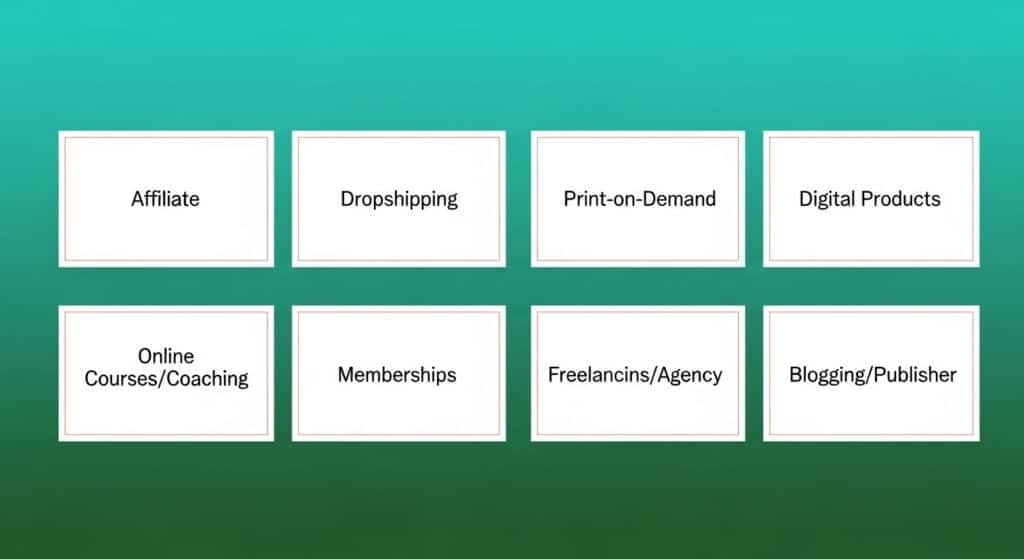
Effort vs. Risk: Where Each Model Sits
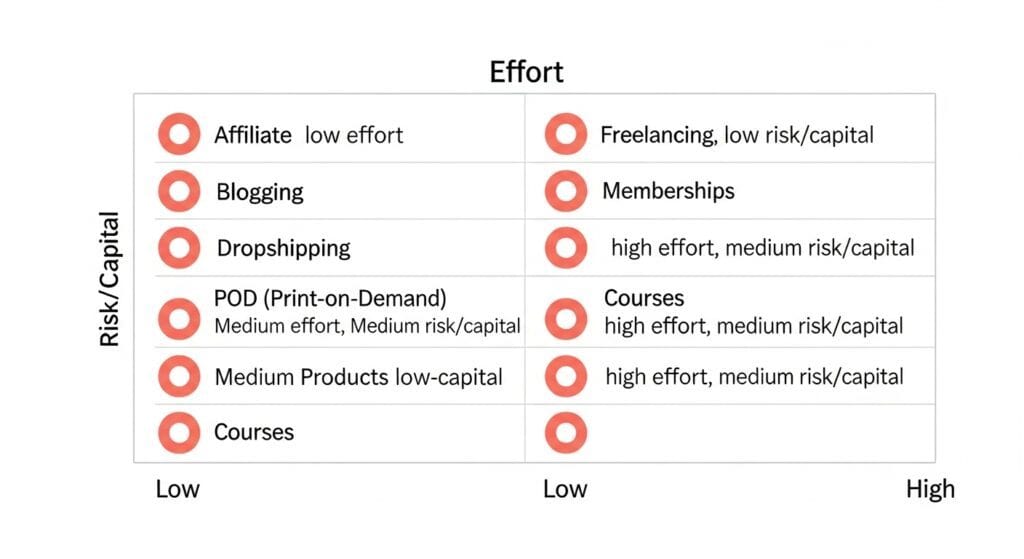
Quick read: Affiliate marketing and blogging often start with the least upfront money. Digital products and courses can earn more per sale but require creation and support. Dropshipping and print-on-demand remove inventory but add store apps, shipping issues, and customer service. Memberships bring recurring income but need ongoing community care. Freelancing earns quickly yet trades time for money.
Affiliate Marketing
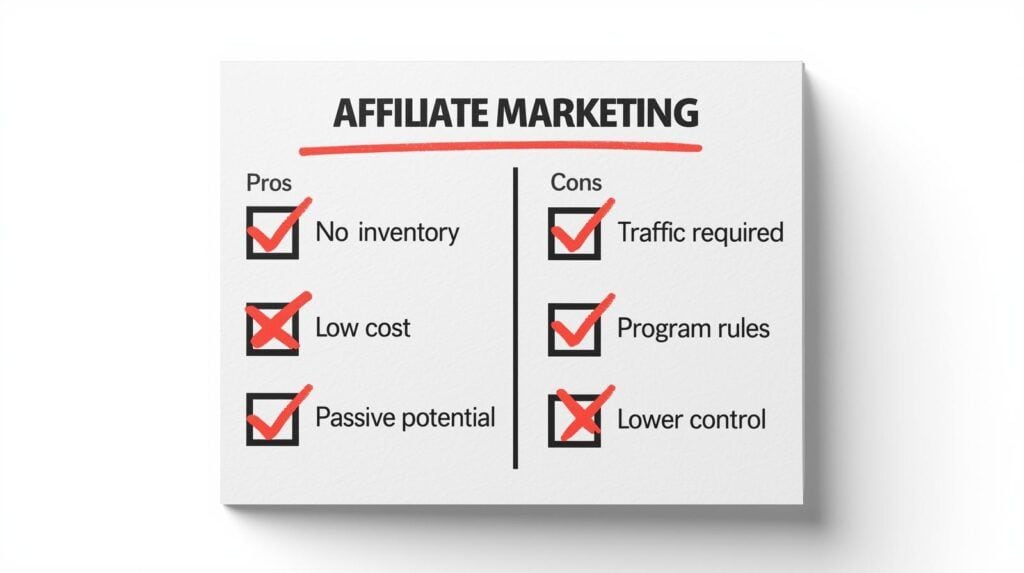
- Pros: Lowest startup costs, no inventory or shipping, flexible schedule, pairs well with blogging and YouTube.
- Cons: Requires consistent content and SEO/social to get traffic; programs have rules and commissions vary.
- Good fit if: You enjoy writing or demonstrating tools and prefer zero customer support.
Thinking about starting with affiliate and blogging? These guides show how this model can work calmly for retirees and beginners:
Dropshipping & Print-on-Demand (POD)
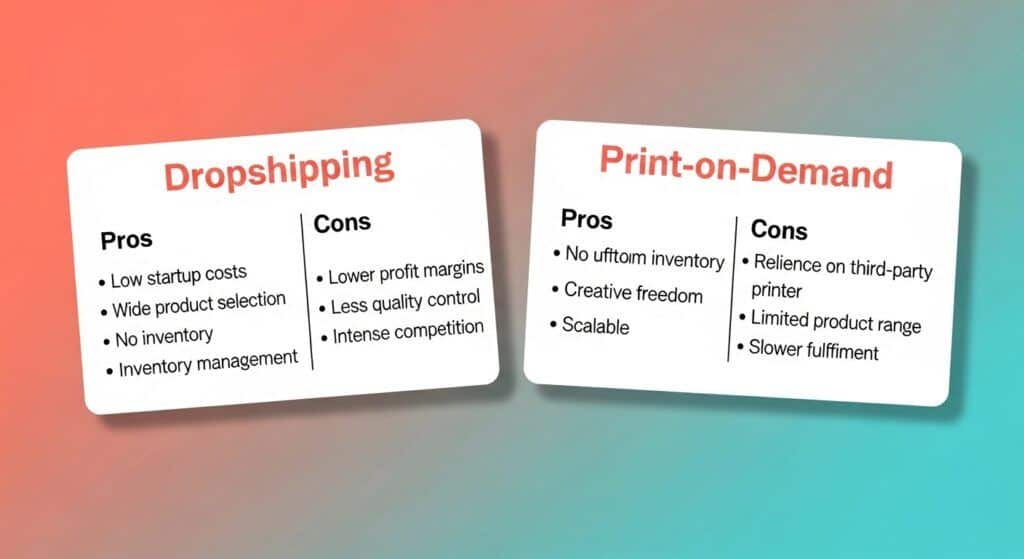
Dropshipping: You list products; suppliers ship. Pros: no stock, wide catalog. Cons: thin margins, shipping times, returns. Works best with clear, niche products and reliable suppliers.
Print-on-Demand: Custom designs printed on demand. Pros: creative, no stock. Cons: design work, sample costs, quality control. Pair with a specific audience (e.g., hobby clubs) for better margins.
Digital Products, Courses & Coaching
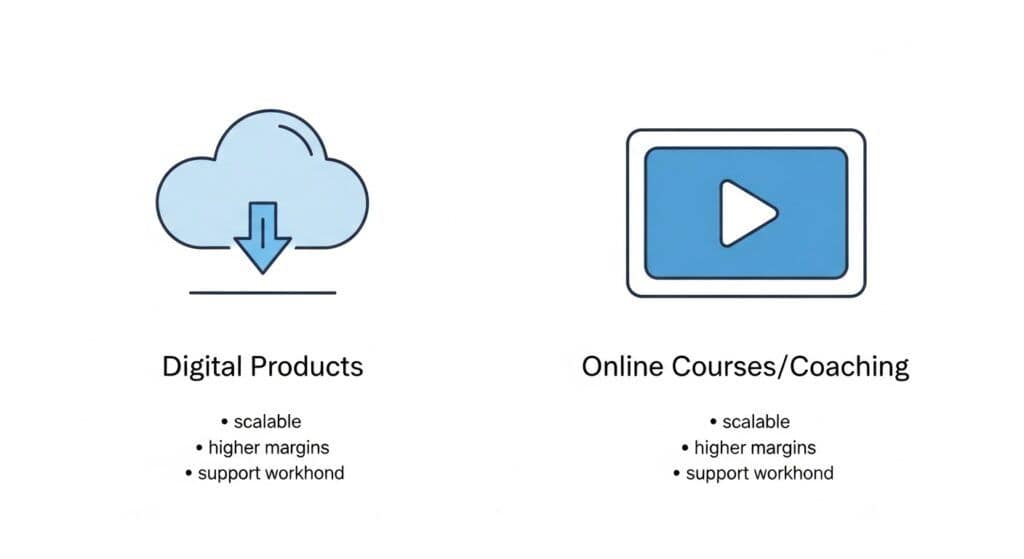
- Digital products: ebooks, templates, checklists. Pros: scalable, simple delivery. Cons: requires audience and updates.
- Courses/Coaching: deeper help via video or sessions. Pros: higher price points. Cons: more workload; tech + community support.
If you’re drawn to digital products, mini-courses, or gentle coaching offers, these resources can help you shape your first offer:
Memberships & Communities
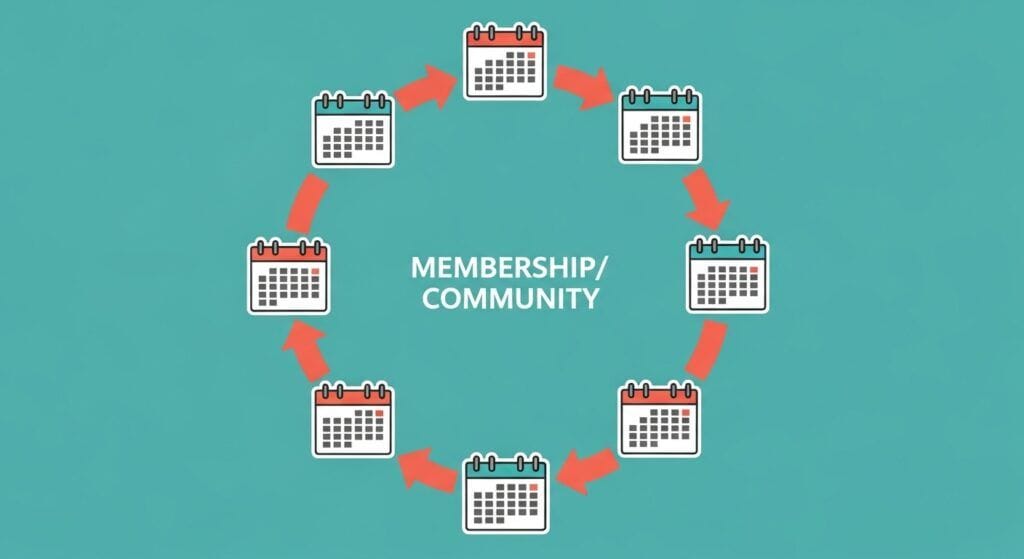
Memberships provide monthly income through premium content, group calls, or community perks. They shine once you have already attracted people who want ongoing help. Plan a simple monthly rhythm—one new resource, one live session, one community prompt—to avoid burnout.
Freelancing/Agency & Blogging/Publisher
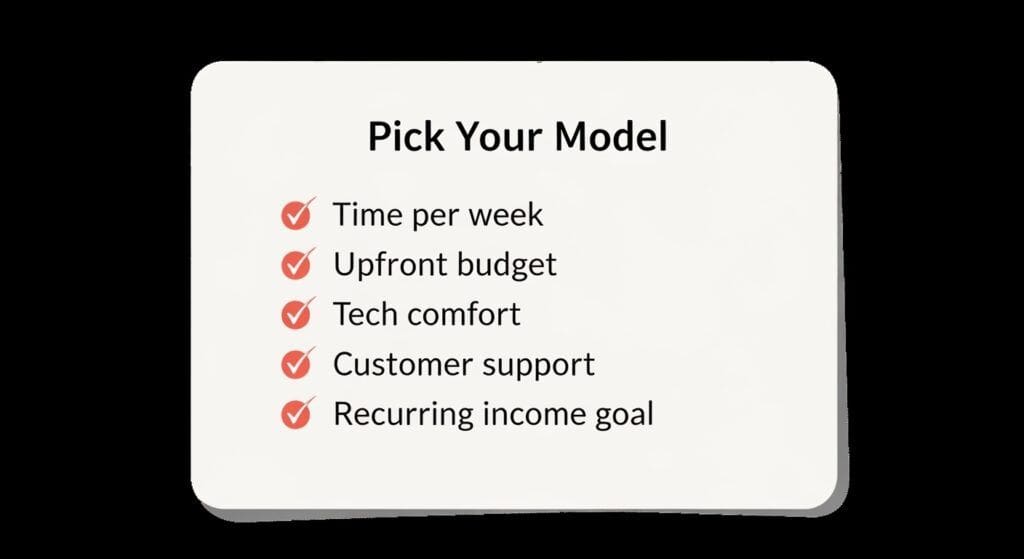
Freelancing/Agency: Fastest to first dollars because you sell services you already know. Great for part-time. The trade-off is time-for-money and client management.
Blogging/Publisher: Build an info site that earns via affiliate links and ads. Low cost, compounding traffic, and no customer support—ideal for patient builders. Requires consistent publishing and basic SEO.
Side-by-Side Comparison (Skim Friendly)
| Model | Startup Cost | Time to First $ | Support Load | Tech Level | Passive Potential |
|---|---|---|---|---|---|
| Affiliate | Low | Slow → Medium | None | Low | Medium |
| Blogging/Publisher | Low | Slow | None | Low | Medium → High |
| Dropshipping | Low → Medium | Medium | High | Medium | Low → Medium |
| Print-on-Demand | Low → Medium | Medium | Medium | Medium | Low → Medium |
| Digital Products | Low | Medium | Low | Low | Medium → High |
| Courses/Coaching | Low | Medium | High | Medium | Medium |
| Memberships | Low | Medium | High | Medium | High (once stable) |
| Freelancing/Agency | Low | Fast | High | Low | Low |
How to read this: “Passive potential” improves as your content, SEO, or email list compounds. Time to first dollars is often fastest with freelancing, while the most hands-off earnings for retirees tend to come later from blogging + affiliate + simple digital downloads.
Pros and Cons of Online Business Models: Key Takeaways
Affiliate: Publish helpful tutorials, comparisons, and reviews. Interlink your posts and add a simple email signup so early traffic compounds.
Blogging/Publisher: Best for patient builders with 5–10 hours per week. Consistency wins—one new post + one update each week is a great cadence.
Dropshipping/POD: Keep a tiny catalog (5–10 winners), choose reliable suppliers, set clear shipping expectations, and watch margins closely.
Digital Products: Start with one small, useful download (checklist, tracker, template). Ship version 1 in a week and improve from buyer feedback.
Courses & Coaching: Pilot a 3-lesson mini course or two coaching sessions before recording a full curriculum. Group formats reduce workload.
Memberships: Promise a predictable monthly rhythm (e.g., one new resource, one live session, one community prompt). Reliability beats volume.
Freelancing: Package one tiny service (fixed scope, fixed price). A “productized” offer avoids hourly haggling and fits part-time schedules.
Smart Combos That Work Well
- Blogging + Affiliate → Digital Downloads: Teach in posts; sell a matching template or tracker.
- YouTube Tutorials + Affiliate: Show the steps, link the tools in video description and article.
- Freelancing → Course: Turn repeated client advice into a short self-serve course.
- Newsletter + Membership: Start free, add a low-cost paid tier later for deeper help.
Budget & Time Planning for Retirees
Under $100/month: Blogging + affiliate. Invest in domain + hosting and publish 1–2 articles weekly. Add Pinterest pins and a simple email signup.
$100–$500/month: Test a tiny dropshipping/POD catalog or create a small digital product bundle. Prefer organic traffic first; paid ads only after your offer converts.
Time plan (5–10 hours/week): 2 hours outlining/research, 2–4 hours writing or building, 1 hour publishing and sharing, 1 hour learning/refining.
Once you know your time and budget, these guides can help you pick and plan the calmest model for your life:
30-Day Starter Plan (Print This)
- Pick one model and one niche. Write a one-sentence goal.
- Set up basics (domain/hosting or store profile). Keep the design clean.
- Create one helpful asset per week (post, product, video, or offer).
- Add two internal links and one external citation to every new piece.
- Share once on Pinterest and once in a relevant community thread.
- Review what performed best; repeat what worked next month.
Common Mistakes (and Easy Fixes)
- Too many products at launch: Start with 3–5 and tighten your message.
- Skipping disclosures: Add a short affiliate disclosure at the top of posts with links.
- Ignoring search intent: Answer the exact question the reader typed—fast—then expand.
- Weak internal linking: Link new posts to 2–3 older posts to help SEO and readers.
Decision Checklist (Print or Save)
- How many hours per week can I give without stress (5, 10, 15+)?
- How much upfront cash is comfortable (under $100, under $500, $1k+)?
- Do I want customer service responsibilities (yes/no)?
- Am I comfortable on camera or do I prefer writing?
- Is recurring income important to me this year?
- What niche or audience do I enjoy serving for months?
FAQ
Which model is the least stressful? Affiliate + blogging. No shipping, no returns. Your job is to teach and recommend.
What if I want faster income? Freelancing. Package a small service (setup, writing, editing, design) and sell it to a clear niche.
When should I add a second model? After your first channel is steady (e.g., 1–2 posts per week for two months) and you have simple routines in place.
More helpful reads: Affiliate Marketing 101 · Starter Kit · Validate Your Idea · Market Research · Niching Down · Tools & Resources
Helpful External Resources
Next Steps: Choose One Model and Start Gently
You don’t have to commit to a complicated business from day one. Start by choosing one model that feels calm and realistic for your season of life, then give it a small, honest test over the next 30 days.
To make that easier, you can download my free Affiliate Marketing Starter Kit for Beginners . It’s designed especially for retirees and ageless beginners and walks you through choosing a niche, planning content, and tracking progress in a steady, low-pressure way.
If you’d like step-by-step training, website tools, and a supportive community in one place, you can also learn inside Wealthy Affiliate . Their lessons and hosting pair well with the models in this guide, especially blogging + affiliate plus simple digital downloads.
For now, pick one model from your shortlist, write down a tiny action you can take this week, and let that be your starting point. Small, consistent steps matter more than picking the “perfect” model.


I just wanted to say how much this post meant to me. I’m at a point in my life where I’m really trying to find a way to build a business around something I love, but honestly, it’s been a little overwhelming and scary at times. Reading your words made me feel less alone and reminded me that it’s okay to start small and figure things out along the way. I’m so grateful for how practical and encouraging your advice is — it gave me a real boost of motivation today. If you had to give just one piece of advice to someone who’s feeling a little lost but determined, what would it be?
Thank you so much for sharing this — your words truly mean a lot.
I know firsthand how overwhelming and uncertain this journey can feel, especially when you’re trying to build something meaningful out of what you love.
I’m really glad the post gave you a bit of clarity and motivation!
If I had to give just one piece of advice, it would be this: start by taking imperfect action. Don’t wait until everything is perfectly mapped out—progress comes from doing, testing, and learning as you go. Even small steps can lead to big shifts over time. You’ve already got the most important ingredient: determination. Keep going—you’re not alone in this.
There are so many wonderful ways to make money online nowadays, and there is something for everyone. No excuses that you don’t have a job, simply start your own gig online.
I personally love the affiliate marketing model as it is simple and you can grow at your own pace, as well as have the opportunity to make money over and over from content you post over time.
I also enjoy affiliate marketing as you don’t need to keep stock and worry about shipping.
Hi Michel,
Thanks so much for your comment—I completely agree with you! The online world really has opened up so many possibilities, and it’s empowering to know that anyone can get started, no matter their background or resources.
Affiliate marketing is such a great model for all the reasons you mentioned—low overhead, no inventory, and the potential for passive income from content that keeps working for you over time. I love that you pointed out the ability to grow at your own pace, too—it’s perfect for people who want flexibility while building something meaningful.
Wishing you continued success with your affiliate journey, and thanks again for sharing your thoughts!
Warmly,
Gila